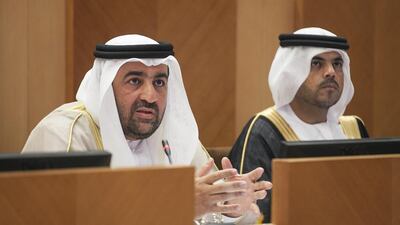ABU DHABI // Members of the FNC have again clashed with the Minister of Environment, but this time the council may have had a strong position.
On March 24, the council was to debate a food-security bill with the minister, Dr Rashid bin Fahad. The debate was set after a council committee held closed-door meetings with experts and senior ministry officials.
But amendments made to the law left the minister and members arguing for several hours. He believed the changes had altered the bill completely.
The new bill mentioned animal fodder but Dr bin Fahad believed that placed animal food on par with human food.
Members spent hours justifying the changes and asked the minister why he reacted so strongly to the proposed amendments when his own agency was in favour of them during committee meetings.
They said ministry officials had objected only to two or three articles, giving them the impression that the discussion would go smoothly in the public session.
Dr bin Fahad said the law would be an embarrassment to the country.
A member argued that the minister’s objections meant the council was doing double the work – once at committee level and then in session.
The minister responded that it was his right as a government representative to offer his opinion and participate in the debate, no matter what decisions had been made in committees.
The Speaker, Mohammed Al Murr, clarified that debates were the norm in all parliaments and councils, and a natural part of the work process.
But as the debate on animal fodder continued, members realised that it could go into the evening despite their efforts to wrap up by 4pm.
The members and the Speaker suggested that the bill should return to the committee, giving some sort of compromise a chance. But Dr bin Fahad objected to returning to the council for more debate. Although he promised members the discussion would finish quickly, more than half of the bill was untouched.
Mr Al Murr reiterated that the ministry had only objected to a few points.
He told Dr bin Fahad that if he was planning to continue the debate in that manner then it would need to be postponed.
While it did seem that the minister was cornered by the ultimatum, the council’s point of view was understandable. It was not unreasonable to assume that if the ministry was in favour of the amendments, the minister himself would be.
It is odd that the ministers often do not agree with their representatives at the ministry. If they were united in their views, it would speed the council’s work, and bills could pass with greater efficiency.

